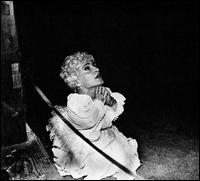 I'm just going to say it: I find Deerhunter a little scary. Not dude-in-sunglasses-howling-obscenities-whilst-wearing-a-dress-smeared-in-fake-blood scary (that stage in the band's development was more funny than anything). I'm talking how-are-they-so-consistently-good scary?
I'm just going to say it: I find Deerhunter a little scary. Not dude-in-sunglasses-howling-obscenities-whilst-wearing-a-dress-smeared-in-fake-blood scary (that stage in the band's development was more funny than anything). I'm talking how-are-they-so-consistently-good scary?
It may not seem like a lot, but over a scant few years, the band has released a pair of stunning full-lengths, a "bonus" album that shames most group's main releases, and a pair of solid EPs that contain some of their best tunes—and that's not including two excellent LPs by frontman Bradford Cox's Atlas Sound project and a decent one by guitarist Lockett Pundt's Lotus Plaza. Aside from a very regrettably named debut album—something even the band seem to roundly acknowledge as a mistake—the overall quality of their output is way above par...and a tad suspicious. Off-putting, even.
Now, after that kind of biographical build-up, this is usually the part where the reviewer states: "And now to top it all off, they've gone and released their best album yet!" And wouldn't you know it...
Whether or not Halcyon Digest is the band's best album is up for debate, but one thing's for certain: they've thrown together an exceptional record that deserves that kind of consideration. And why is such a distinction worth more than a cheap Kinko's-made commemorative plaque hung up in the band's dingy rehearsal space? Because Deerhunter have quickly gone from being contenders to standard bearers—one of the best bands of their ilk and moment.
And I do mean "band". As much as Cox gets all the headlines and most of the credit, Halcyon Digest succeeds on the back of elegant and exquisite communication between all four members. Bassist Josh Fauver and drummer Moses Archuleta have a knack for understanding how and when to drive a song. Their playing is subtle and in the pocket throughout, which is good since, as a collection, this is Deerhunter's poppiest and most laidback album. Pundt's two tunes have already been roundly praised as two of the best on the record, and rightly so. In particular, mid-album centerpiece "Desire Lines" is a total stunner—Microcastle's "Nothing Ever Happened" in a more graceful pose, from its gently nodding chorus through to its swirling, endless coda.
With Pundt locking down a pair of classic pop tunes that act as the album's rudder, Cox ambles creatively around its perimeter—ranging wildly from stoic one-man ballads ("Sailing"), late-era Slowdive atmospherics ("Earthquake"), clanging acoustic rave-ups ("Revival"), and even old-school saxophone workouts ("Coronado"). These tastes all coalesce on first single, "Helicopter"—a chimerical gumbo of nearly everything he loves as a writer: glitchy electronics, swooping synth lines, lush guitar effects, and sighing pop hooks. About the only thing missing from it—and the whole record—is the sinister vitriol that defined half of breakthrough LP Cryptograms: the same kind of strobe-fueled vehemence that got them opening slots for Nine Inch Nails back in the day. Is it missed? It was always this writer's least favourite part of the group's sound—especially live, where when paired with Cox's theatrics, it could come off as a university student's insincere hoax. Besides, it's always something they can go back to. For now, Cox and co. have found a far more effective way of scaring people—by releasing album after album after album of impossibly great psychedelic pop music.